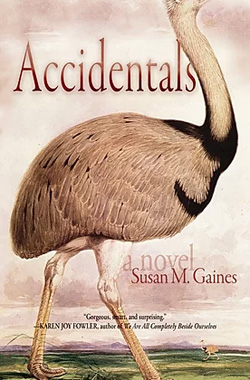 When first we meet Gabriel Haynes, the narrator of Susan M. Gaines’ luminous sophomore novel, the year is 1999 and he is a recent college graduate with a cubicle-farm job, newly divorced parents, and an abiding passion for birding. That’s when Gabe’s mother Lili, a naturalized U.S. citizen and junior college professor, surprises her son by announcing her intention to leave her comfortable Bay Area home – “I can’t stand this big monster country anymore!” – and return to her native Uruguay after a 30-year absence in order to begin her life anew, growing organic vegetables on her late father’s abandoned estancia. Wouldn’t Gabe like to come along and spend a few weeks helping her get settled?
When first we meet Gabriel Haynes, the narrator of Susan M. Gaines’ luminous sophomore novel, the year is 1999 and he is a recent college graduate with a cubicle-farm job, newly divorced parents, and an abiding passion for birding. That’s when Gabe’s mother Lili, a naturalized U.S. citizen and junior college professor, surprises her son by announcing her intention to leave her comfortable Bay Area home – “I can’t stand this big monster country anymore!” – and return to her native Uruguay after a 30-year absence in order to begin her life anew, growing organic vegetables on her late father’s abandoned estancia. Wouldn’t Gabe like to come along and spend a few weeks helping her get settled?
Thus begins Gabe’s life-altering immersion not just in his mother’s side of the family and not just in the culture and natural environment of their modern Uruguay, but also in the country’s dark political history. Gabe’s uncle Juan Luis Quiroga is an avowed capitalist who envisions the estancia as a commercial rice farm once he’s diverted the stream that feeds the isolated marsh in which Gabe, soon after his arrival, discovers a new and endangered avian species. Gabe’s uncle Rubén Quiroga, now a happy-go-lucky divorcee, had been a political dissident in the early 1970s, a time when Uruguay’s civic-military dictatorship was employing torture and murder to brutally suppress its leftist Tupamoro insurgency. Rubén, moreover, had once loved and abetted Eva Paden, Lili’s best girlhood friend who, after Lili’s departure for California, went on to become a legendary guerilla fighter and martyr to the Tupamoro cause.
Shuttling between his abuela’s home in Montevideo and the family’s rural estancia, Gabe is initially content to assist Lili with her gardening projects, explore the city he vaguely recalls from his childhood visits, and spend his free time birding. All of this changes, however, once Gabe has a chance encounter with Alejandra Silva, a beautiful microbiologist collecting water samples on a neighboring farm. Alejandra, you see, is Eva Paden’s orphaned daughter, and once the initial flirtation between Alejandra and Gabe blossoms into an earnest love affair, the complex interconnections between and among their respective families threaten to tear the young lovers asunder.
Accidentals, then, is a love story set against a backdrop of family strife and secrets – a kind of Shakespearean tragedy freighted with Cold War politics, environmental urgency, and birds. (The book’s title derives from the term for a bird that’s unexpectedly sighted far from its native habitat.) While it’s unsurprising that Gaines, a geochemist who codirects the Fiction Meets Science Program at the University of Bremen, knows her stuff when it comes to Gabe’s ornithology and Alejandra’s microbial biology, what will surprise and delight readers of this sprawling, heart-wrenching novel is her masterful storytelling and beautifully-wrought prose, not to mention her gift for confecting fully realized characters whose emotional struggles resonate throughout and linger long after the book’s final chapter.
While some readers might find their attention diverted either by the novel’s languid early pace or by its occasional digressions into scientific minutiae, they may rest assured that the emotional pyrotechnics of the story’s final third will provide more than ample reward. So for a deeply immersive foray into the thorny thickets of politics, nature, history, love, and family, Accidentals ($18.95, Torrey House Press) is a spellbinding novel from a writer whom you may not (yet) know, but whose praises you’ll soon be singing.
Chuck Greaves/C. Joseph Greaves is the author of six novels, most recently Church of the Graveyard Saints, the Four Corners/One Book community reading selection for 2019-2020. You can visit him at www.chuckgreaves.com.








